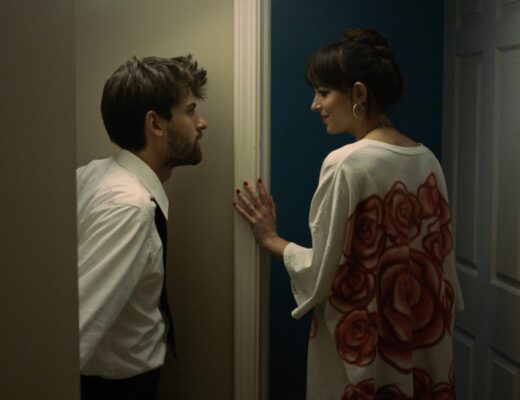Italian Studies is a banal, ponderous work that fails to land on any interesting or governing thesis.
Dislocation and dissociation lie at the heart of Italian Studies, a work straddling narrative and documentary, identified precisely through its rejection of stable, reliable identity. The third feature from Adam Leon (who previously directed comedies Gimme the Loot and Tramps), Italian Studies pivots into heavier territory, centered around and within the headspace of Alina Reynolds (Vanessa Kirby), an amnesiac writer attempting to reclaim herself on the bustling streets of New York. For most of its economical seventy-eight minutes, Kirby puts on a one-woman show, journeying across fluctuating memories and fleeting impressions of her character’s environment in a perpetual fugue state. Her mental odyssey switches back and forth between the nocturnal and diurnal, seamless and unrestrained; the film’s frequent inclusion of J- and L-cuts assists these transitions, whose diegetic contents clash with their extradiegetic form and result in a slippery contouring well-suited to the spaces of imagination. It is this space into which Alina, without a concrete referent or anchor, slips, construing from its fertile depths a reality borrowed, inspired, and adapted from the fragments of others’.
Tapping into the city’s penchant for and obscene abundance of naturalism, Italian Studies surveys through Alina’s eyes New York’s cosmopolitan sea of faces, out of which her personal narrative finds its existential thrust. Defined by and against the city, isolated by virtue of her psychological tabula rasa but connected through lived experiences among its inhabitants, she mingles with diverse crowds mostly as a spectral presence, on occasion revealing a dialectical engagement beyond mere ethnographic appraisal. At a takeaway, she encounters Simon, an awkwardly genial youngster trying to sell her weed and hotdogs but, like her, mostly in search of companionship. Their interaction, cryptic yet tender, hints at a further backstory never shown. Elsewhere, she blends in with a casual group of youths who offer varying expressions of their hopes, ideas, personalities, and so on. The film’s central conceit slowly reveals itself: these fragmented encounters have made their way into Alina’s short-story collection, from where Italian Studies derives its eponymous title. She, however, has little recollection of it, relying on the clues her disjointed memory offers for a hazy approximation of reality.
In theory a promisingly ambitious study of both the atomized and collective layers of the societal landscapes littering our modern world, Leon’s autofictive approach forms a closed-circuit loop which ultimately devolves into the inconsequential, stymying an otherwise tantalizingly intertextual dialogue between the amphibious elements of reality and artifice that make up storytelling. Kirby’s persistently wide-eyed ambivalence is symptomatic of the film’s larger issue with its pacing; initially pensive, the screenplay’s banal rhythm — mistaken for improvisatory flair — soon turns ponderous, even for Alina herself. Unlike Nicolás Pereda’s drolly engaging Fauna, featuring a similarly metafictional construct, Italian Studies lacks the former’s cultural specificity, resorting to conventional wisdom and faux-realism in the urban signifiers that prop up the writer’s real and literary personas. Perhaps Leon might be articulating a grim reality about modernity’s cultural limitations after all; even so, it’s presented as a fait accompli, leaving Kirby (and us) in the dark to come to terms with, and then inexplicably transcend, its unestablished fiction.
Originally published as part of Tribeca Film Festival 2021 — Dispatch 4.







